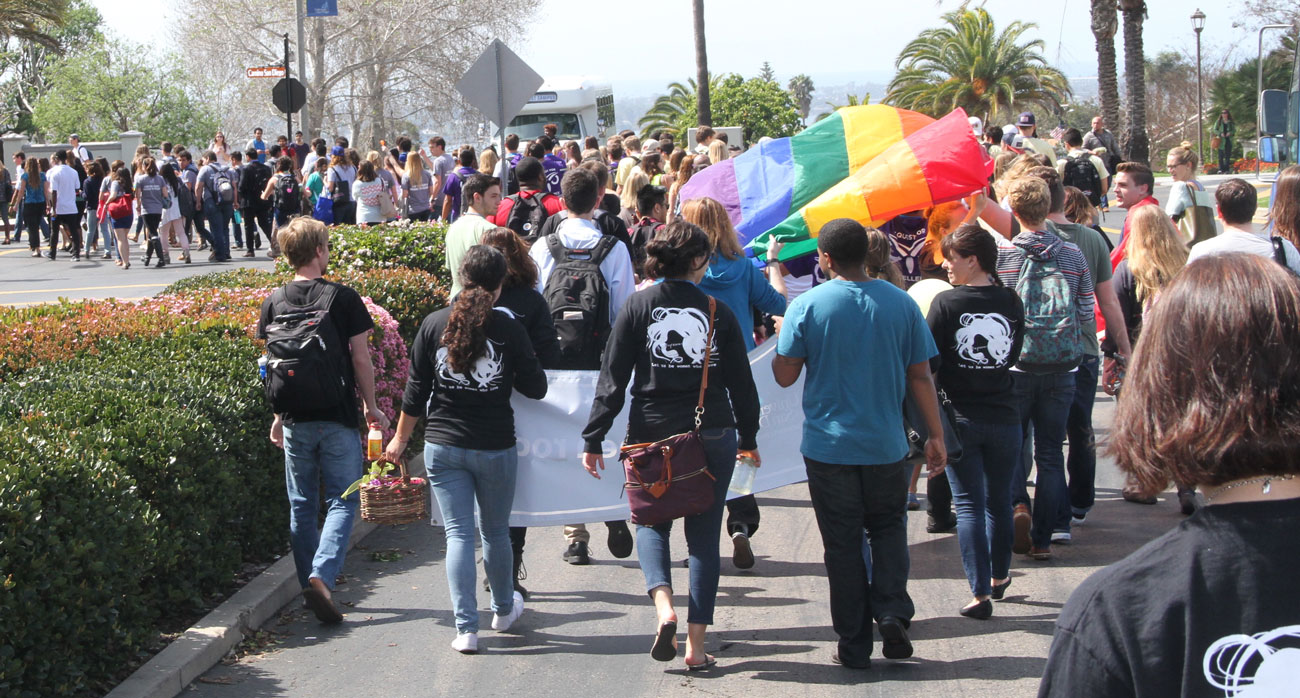The LGBTQ community at the Catholic University of San Diego will sponsor “PRIDE’s Celebration of Gender Expression: Supreme Drag Superstar V” on April 14, 2016. The “drag show” is described by the organizers as an: “‘edu-tainment’ event for the campus community, speakers teach about the experiences of trans- and gender-fluid communities…”
Author’s note: “Catholic” supported debates, talks, speeches, dialogues, and events such as these are often staged under the pretense of charity, mercy, and or Christian tolerance; in reality, because, oftentimes there is no opposing voice, they merely confirm the confusion within those who are supposedly the object of the outreach. For instance, an extremely tilted discussion concerning homosexuality recently held at Saint Mary’s College in California, caused one of the College’s professors to speak out against it; Father David Gentry-Akin, professor of theology, said: “This event is indoctrination, not education, because only one point of view is being entertained. Even in the most secular of environments, even in an environment that claims not to espouse any particular tradition, that would not be education because it’s not an event that entertains all sides of a question.” Now, what they have done at USD is to completely move beyond the charade of a debate and openly celebrate a lifestyle choice that is fraught with disease, substance abuse and mental illness.
What should be presented and openly discussed at this event:
According to the CDC:
“Findings from a meta-analysis of 29 published studies showed that 27.7% of transgender women tested positive for HIV infection…”
Division of HIV/AIDS Prevention, National Center for HIV/AIDS, Viral Hepatitis, Sexual Transmitted Diseases and Tuberculosis Prevention, Centers for Disease Control and Prevention
According to one recent international analysis, transgender women have 49 times the odds of having HIV compared to the general population. While transgender men are less likely to be HIV positive than transgender women, their rates of infection are still higher than that of the general population.
“Worldwide burden of HIV in transgender women: a systematic review and meta-analysis”
Dr Stefan D Baral, MD, Tonia Poteat, PhD, et al.
Lancet Infect Dis 2013 Mar 21;13(3):214-22.
“Overall, 26% engaged in sexual risk behavior in the prior three months (i.e., unprotected sex with a nontransgender male, condom breakage, or anonymous sex). The majority (61%) had a DSM-IV (Diagnostic and Statistical Manual of Mental Disorders, 4th Edition) diagnosis (52% depression, 52% anxiety, and 26% adjustment disorder), and regular alcohol use was common (65%).”
“Sexual risk behaviors and psychosocial health concerns of female-to-male transgender men screening for STDs at an urban community health center.”
Reisner SL, et al.
AIDS Care. 2014;26(7):857-64.
“The sample evidenced high rates of recent alcohol (57.7 %), marijuana (25.6 %), and methamphetamine (21.5 %) use, lifetime injection drug or illegal hormone use (66.3 %), and recent engagement in sex work (73.3 %).”
“HIV prevalence, substance use, and sexual risk behaviors among transgender women recruited through outreach.”
Reback CJ, Fletcher JB.
AIDS Behav. 2014 Jul;18(7):1359-67.
“Of the 298 transgender women, 41.5% of participants had 1 or more mental health or substance dependence diagnoses; 1 in 5 (20.1%) had 2 or more comorbid psychiatric diagnoses.”
“Psychiatric Diagnoses and Comorbidities in a Diverse, Multicity Cohort of Young Transgender Women”
Sari L. Reisner, ScD, Katie B. Biello, PhD, MPH, et al.
JAMA Pediatr. Published online March 21, 2016.





